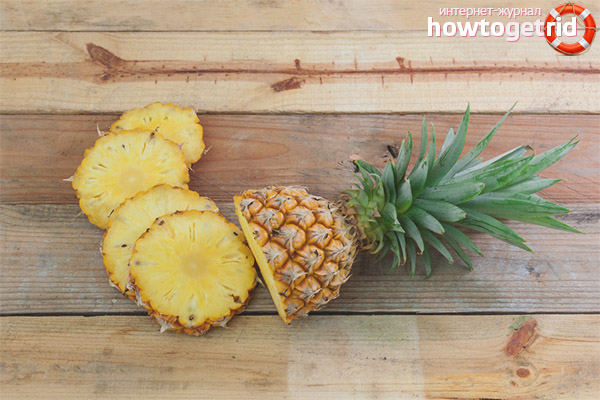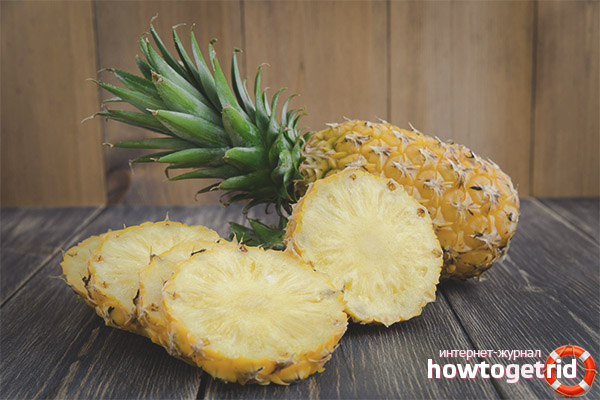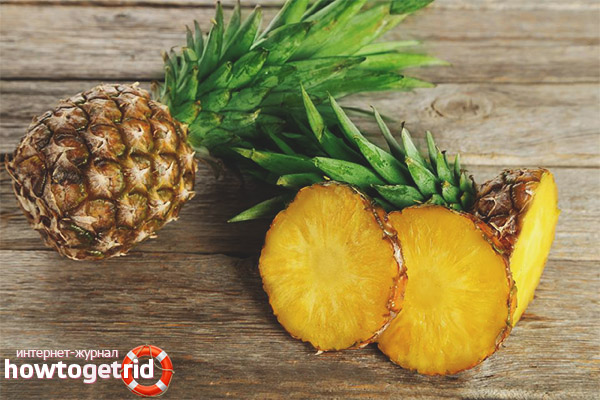The content of the article
Exotic sweet pineapple beckons expectant mothers with its unique taste. Many pregnant women say that they really want to enjoy the juicy pulp, or at least bring down the edge of pineapple juice.
This fruit is a valuable source of nutrients, including the rare enzyme bromelain, which maintains normal weight and metabolism. However, expectant mothers should not worry about losing weight, so it is advisable to study all the useful and negative properties of pineapple.
Chemical composition
The pulp of a tropical fruit consists mainly of liquid and coarse dietary fiber, which is indispensable for digestive processes, motility and motility.
Pineapple also has the following components:
- vitamins (A, B, C, E, D);
- minerals (iron, phosphorus, sodium, calcium, potassium, magnesium, zinc, copper and others);
- organic acids;
- antioxidants;
- enzymes (bromelain);
- tannins;
- ethers.
Bromelain is an exceptional compound that performs several functions at once:
- improves mood;
- improves the tone of the vascular walls and cleans them of atherosclerotic plaques, toxins, “bad” cholesterol;
- prolongs youthful skin and promotes cell regeneration;
- stimulates the secretion of hydrochloric acid, providing high-quality digestion;
- kills pathogens in the intestines;
- breaks down proteins of animal origin, contributing to a more complete assimilation of them.
Iron prophylaxis of anemia and hemoglobin deficiency, which often occurs in pregnant women. And in combination with ascorbic acid, the trace element is absorbed more fully.
Pineapple also contains folic acid, which gynecologists prescribe to women during pregnancy planning, as well as in the first trimester. This vitamin provides the formation of the neural tube of the child, prevents the development of pathologies and defects of the nervous system, brain.
In addition, the sweet dish is not high-calorie, because 100 g of the product contains only 48 kcal.
Useful properties of pineapple during pregnancy
Exotic fruit is very useful for the future mother and baby, of course, in adequate quantities. It produces the following beneficial effects on their organisms.
- It removes excess fluid from the body due to the diuretic effect and activation of the kidneys. As a result, the expectant mother decreases puffiness, which can cause severe discomfort and even provoke pregnancy complications - gestosis.
- It quickly satisfies hunger and saturates the body with energy. At the same time, expectant mothers are happy to eat pineapple even during toxicosis, as the fruit reduces nausea and normalizes digestion.
- Raises the level of hemoglobin - a blood substance that transports oxygen to tissues and cells.
- Regulates blood coagulation. The beneficial components of pineapple gently dilute the blood, reducing the risks of thrombosis and varicose veins that are characteristic of pregnancy. As a result, the blood does not stagnate in the lower extremities, swelling and numbness of the legs disappear.
- It has a positive effect on digestion, stimulating the secretion of gastric juice, reducing flatulence and bloating, and colic.Pineapple is successfully used for the treatment of chronic constipation and hemorrhoids of pregnant women, because thanks to the abundance of dietary fiber, it perfectly cleans the intestines from metabolites, toxins and toxins.
- Lowers blood pressure. Exotic fetus allows you to deal with hypertensive conditions during pregnancy: hypertension, eclampsia and preeclampsia.
- Prevents vitamin deficiency. Pineapple is supplied in hypermarkets year-round and contains a significant amount of essential vitamins and minerals. It is ideal for preventing seasonal vitamin deficiency.
- Strengthens the central nervous system and brain. Vitamins B and magnesium in the composition of the fruit positively affect the nervous system, eliminate irritability and anxiety, nervousness, depression. Also, the fruit stimulates the brain, improves productivity, improves memory.
How to choose and use
In our countries, pineapple is not a local fruit, so you can only find it in supermarkets or specialty stores.
A good ripe pineapple should be firm enough, but resilient. Each flake should be tightly soldered to the other, since friability indicates the age of the fruit. Carefully rotate the fruit in your hand, inspect the surface for the presence of soft zones, scuffs, spots.
The smell of pineapple should be characteristic, but not strong. Too pronounced aroma indicates the use of flavorings and esters. Also, notes of rot, acid, mold or mustiness should not be present in the smell.
Only the right fetus will benefit the future mother and baby. But it’s better to refuse a pregnant woman from canned pineapple, candied fruit or industrial nectar, because these products contain sweeteners, preservatives, dyes and flavor enhancers.
As for the consumption of fruit, it is undesirable to combine it with animal fats, for example, dairy and sour-milk products. It is advisable to eat the fruit separately from other dishes, but not immediately on an empty stomach, because organic acids can corrode the gastric mucosa, increase the risk of gastritis and ulcers. If the fresh pineapple is too tart and concentrated for you, then you can freeze it, which will make the fruit softer.
Contraindications
Expectant mothers should exclude tropical fruit from the diet in the presence of the following pathologies:
- acute hypotension;
- bleeding disorders;
- increased acidity of the stomach, as well as colitis, gastritis, ulcer;
- damage to the oral mucosa (stomatitis, ulcers, glossitis, candidiasis, periodontal disease, periodontitis and others);
- uterine hypertonicity;
- allergy to citruses, yellow or orange fruits;
- acute food poisoning, diarrhea.
Bromelain really provokes muscle contraction, which can cause a feeling of a “stone abdomen” and uterine tone in the second trimester. In the third, such false contractions can provoke an early onset of labor.
Pineapple is a useful fruit for the expectant mother in the event that it is right to choose and eat. But you should not abuse the product in the last trimester, as the risk of premature birth, as well as atopic dermatitis in the newborn, may increase.
Video: how to eat during pregnancy?












Submit